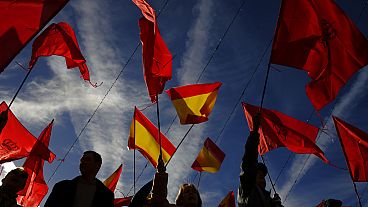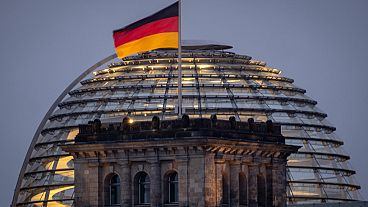As eurozone businesses face sharp declines in outputs and new orders, experts believe the European Central Bank (ECB) faces a complex challenge as it decides whether to continue its cycle of interest rate hikes in September.
The August Purchasing Managers’ Index (PMI), published Wednesday, placed the bloc’s business activity at its lowest level since 2020, driven by a sharp contraction in the services sector and a continued decline in manufacturing. Economic powerhouse Germany is the worst hit.
This poses a dilemma for the ECB, which is expected to make its next move on interest rates in September.
The central bank has been raising the borrowing rate in a bid to curb rising inflation and tame consumer prices. In July, its ninth consecutive rise of 25 basis points took the deposit rate to 3.75%, a joint record high last seen in 2000.
While eurozone inflation is showing signs of abating, dropping to 5.3% in July, it remains well above the ECB medium-term target of 2%. Core inflation - without energy and food prices which are considered more volatile - also remains stubbornly high at 5.5%.
ECB chief Christine Lagarde has repeatedly said interest rates will continue to rise until pressures on consumer prices decline but economic experts believe the negative PMI outlook and other signs of stunting economic growth may split opinions on the Governing Council, the main decision-making body of the ECB.
A 'balance of risks'
"The ECB will be more concerned with the current rates of inflation as opposed to the decline in business activity, which was not at all unexpected," Stefan Gerlach, Research Fellow at the Centre for Economic Policy Research (CEPR) and Chief Economist at EFG Bank, told Euronews. "I suspect some members of the Governing Council will want to remain cautious by raising interest rates further, whilst others will want to pause hikes to ease pressure on the economy."
"The balance of risks is certainly starting to shift. Some ECB governors will be worried that tightening monetary policy further could push the euro area into recession next year," Gerlach added.
One risk experts also disagree over is whether a pause in rate hike would be just that, a pause, or whether it would actually put a definitive end to the past year of tightening monetary policy.
“The risk is high that any pause would spell an end to the rate hike cycle," Carsten Brzeski, Global Head of Macro Research and Chief Eurozone Economist at ING, explained. "This is why the ECB hawks will probably still push for a rate hike in September, which would then be the final hike."
"It currently really is a 50-50 likelihood," he said.
ECB hesitation 'costly'
Brzeski also believes the impact on businesses shows the ECB has "been too benign on the negative impact of its own rate hikes on the economy."
With a time lag between implementing monetary policy and its impact showing up in economic data, other experts believe the ECB's data-based approach is flawed.
"The ECB says its decisions on the level and duration of restrictions are based on a purely data-dependent approach. But data gives us a picture of the present and the past - it does not tell us much about how to design policy for the future," Maria Demertzis, senior fellow at Bruegel, said.
"The ECB continues to put too much emphasis on the past as a way of understanding the future and in my view this has meant decisions come late."
Demertzis believes the ECB should change direction and pause its rate hikes in September.
"If anything, it has already hesitated too much before pausing. It was too late to start increasing interest rates in September and it now risks making the same mistake by exiting late," she said.
But whatever Lagarde says following the rate announcement will be just as critical and closely watched.
"What will happen next remains highly uncertain," Gerlach said, "but the signals in Madame Lagarde’s communications, which have in the past created uncertainty, will also be critical as we move forward."
ECB chief Christine Lagarde has been criticised in the past for communication gaffes which have generated uncertainty on the markets. Her messages in the autumn will be crucial, especially if the Frankfurt-based institution embarks on a new direction as many expect.
The ECB's next Governing Meeting will be held on September 14.



